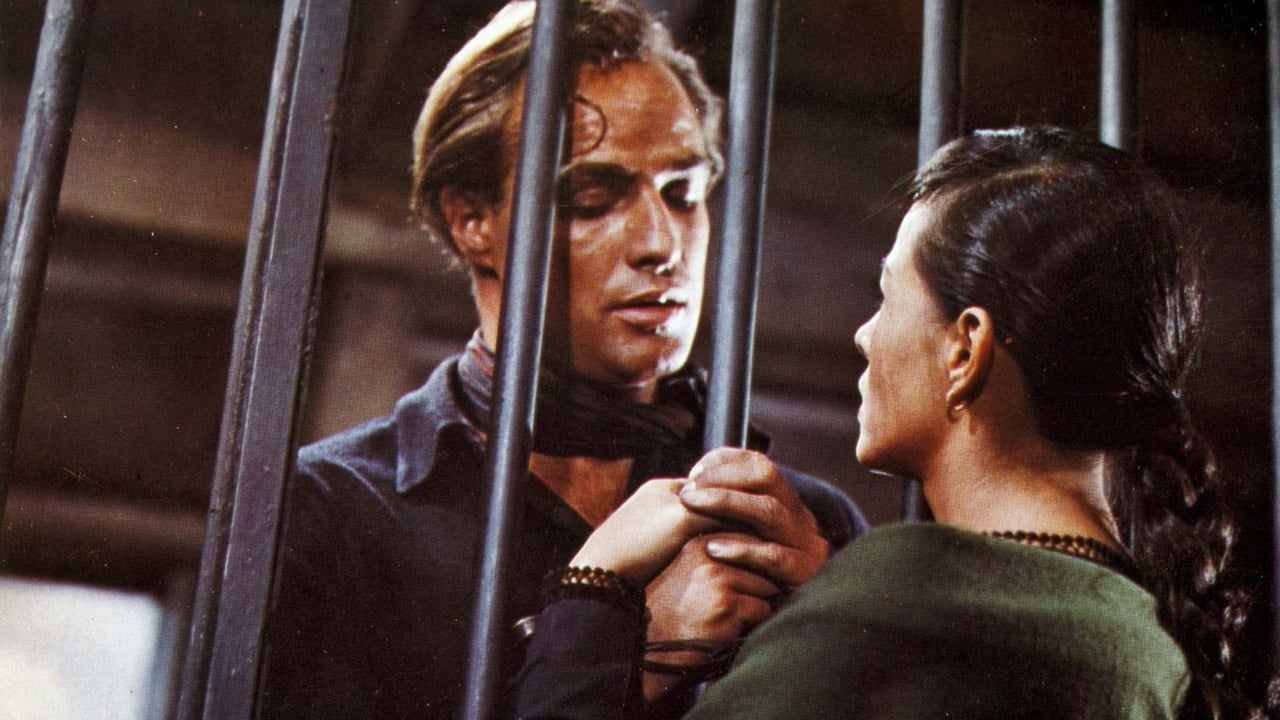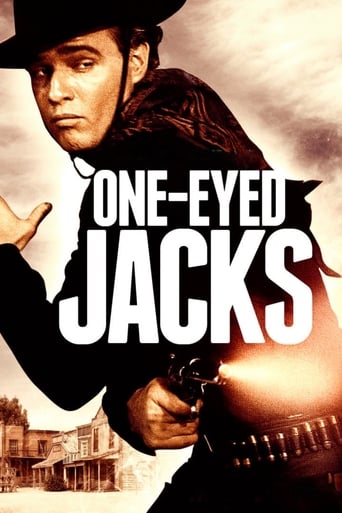

One-Eyed Jacks is a solid, violent and melancholic western directed by MARLON BRANDO. STANLEY KUBRICK worked on this movie for a while as a director before him and Brando fell out over the casting of SPENCER TRACY (Brando wanted KARL MALDEN for the role).BRANDO is at his smoldering and mumbling best here. And he is nearly bursting out of his tight clothes in most of the scenes. There is great chemistry between Brando and Pina Pellicer. The scenes between them are very very intense. And Brando's introduction scene is excellent.The film is extensively filmed near a beach - I haven't seen too many westerns with a beach in them. It is a bit long at 140 minutes, but it is pretty gripping throughout.(7/10)
... View MoreThis movie has it all and then some. One-Eyed Jacks will trick you in a lot of ways as it will come off as a one dimensional western revenge story(which wouldn't have been a bad thing at all) but as the layers keep getting peeled away as the movie progresses, the viewer will find out that there is much more to this movie than meets the eye. It is a story about finding ones self and finding the best, most longing true love one can imagine. The chemistry between Brando and Pina Pellicer is one for the ages. It's as if you're waking up from a dream where you had a great romance and you long to go back to sleep to find that romance again. That's exactly how the longing feels with Brando and Pellicer(especially when Brando is in jail). And that Jail scene where Pellicer is pulled away by the deputy is one of the best scenes I've ever seen, it was so real, passionate, in your face and gritty. Pellicer fights for Brando in all his flaws in that scene. And Brando has a great scene where he's about to blast away Ben Johnson's character as Brando fights for Pellicer's honor. A great character study, a great love story and a great western. Brando and Malden are in top form. After watching this movie I thought I would find Pina Pellicer to have been nominated for at least 2-5 academy awards with winning one or two. I was very sad to learn she died only just a few years after this movie. In some way, I feel Pina Pellicer was the female version of James Dean without the fame. She was a fantastic actress, and what she could have done on the screen, oh what she could have done, she was unbelievable. This is a must see for her and Brando.
... View MoreThis is the only film that Marlon Brando directed. It's easy to understand why no producers would let him get near a camera afterward. It's expensive to expose film, and while Brando the director would argue with Karl Malden the actor, the cameras would roll philosophically along, exposing the rehearsals, the arguments, the conversations about the weather, the new styles in men's clothing, and the conundrum of mind/body dualism. It cost a fortune -- and the result is a long, colorful Western with a conventional revenge plot. By "conventional", I mean that the usual fallacies apply. Whose gun is faster than whose? A clip on the jaw or a whack on the head renders a man unconscious for as long as the plot requires. A dozen men galloping after two fleeing bandits fire their pistols wildly although they're a quarter of a mile behind their quarry.It's not a BAD movie. It's just hard to assess. The location shooting around the Monterey Peninsula in California is rich in texture and exquisite, as is the location itself -- or was, before it turned into Disneyland. Hugo Friedhofer's romantic score is appealing if overused. Brando must have had the cast improvising all over the place and in every instance it seems obvious and awkward. You'll notice the scenes when they come around.The story, briefly, is that Brando is betrayed by his fellow bank robber, Malden, in Mexico. After five years in the Sonoran pen, Brando escapes and seeks revenge on Malden, who has now become civilized and is a popular sheriff with a nice Mexican wife and stepdaughter in Monterey. They shake hands, both faking. Brando spitefully seduces and impregnates the stepdaughter, Pina Pellicer. And when the opportunity presents itself, with the townspeople behind him, Malden reveals his barbaric side, bull whips Brando, and smashes his gun hand. A final shootout resolves some of the issues, but not all.It's far from Brando's best performance. He says little, glowers a lot, and blinks reflexively. When he's facing someone down, his feet are in the first ballet position, and when he walks he puts one foot in front of the other. He must leave not two parallel sets of footprints but a single trail of two prints, one on top of the other.And when you get right down to it, he's a pretty rotten guy. He lies to most of the people he meets, and for the worst of reasons. In the last scene, he rides off romantically into the white dunes of Monterey, leaving behind a winsome young Mexican girl whom he has knocked up out of spite for someone else. And this in a culture where there are only two kinds of women -- Madonnas, who bring their hymens to the party, and whores, for whom anything goes. "I'm off to Oregon but I'll be back for you some day -- maybe, if I find it convenient. So long, baby."Slim Pickens gives a good performance as Lon, "you tub of guts," "you gob of spit." But the best performances are turned in by Karl Malden and his family -- Katy Jurado as the wife, and Pina Pellicer as the slender and beautiful stepdaughter. Much of their dialog is in Spanish. (Both actresses were from Mexico City.) Pellicer, in particular, is bewitching.The movie may have wasted a lot of money but it's by no means a complete waste of time. You'll have to judge for yourself.
... View MoreRunning from the law after a bank robbery in Mexico, Dad Longworth (Karl Malden) finds an opportunity to take the stolen gold and leave his partner Rio (Marlon Brando) to be captured. Years later, Rio escapes from the prison where he has been since, and hunts down Dad for revenge. Dad is now a respectable sheriff in California, and has been living in fear of Rio's return.What would this film have been like in the hands of Stanley Kubrick? Sadly, we will never know. But I would love to hear more about this, how far along it got before Kubrick backed out. Did he touch the script, cast any of the actors? Or was it mostly just talk? Marlon Brando's cut is said to be five hours. I am sure some people want that to be released. I, for one, am not sure I need to see the whole thing. However, this is definitely a film in need of some cleaning up. Good editions might exist, but the one I watched was not one of them. Where is our Criterion special edition?
... View More